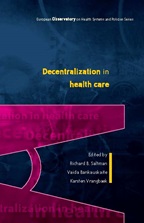Search

Centralization/Decentralization
Placing governance tasks at the right level may have beneficial effects for health systems. The positive side of decentralization is associated in the literature with improved technical and allocative efficiency, empowerment of local actors, stimulus to innovation, increased accountability, and improved quality and equity. In general, it is assumed that actors at subnational level have a better understanding of the regional and local circumstances and can use resources more efficiently than a centralized body.
Certain tasks, however, must be centralized. They include, for example, health policy development and the development of a quality strategy, to make sure that patients across the country can expect the same conditions of access, coverage and service delivery. Public health institutes, health technology agencies and other regulatory agencies are also preferably placed at national level, even if they have decentralized offices at regional and local levels.
The challenge, however, is that even if organizations and tasks occur at the right level they may not yield the expected benefits because of shortcomings in the governance. Ministries of health, for example, often lack the capacity to steer the system. The have difficulties developing complex policies because of a lack of qualified staff due to continuous public service staff cuts. Leading on health policy may also be difficult if all the operational work is handled by arms-length executive bodies or by sickness funds that have stronger analytical powers and much better insights into the workings of the system. At regional or local level, empowerment of providers will not yield benefits if they are not aligned with national policy, which is often the case because of a lack of transparency and accountability between central and subnational organizations.
The European Observatory’s work programme supports governments by reviewing the evidence on how to master the centralization/decentralization challenge:
- Which are the tasks that must be with the government?
- Which are the tasks and organizations that must be at central level?
- Which are the tasks that are better to be decentralized?
- How can government align organizations and tasks across all levels?
Related publications

Decentralization has become a popular management strategy in many European health care systems. The logic of decentralization is an intrinsically powerful...
19 February 2018
What is the experience of decentralized hospital governance in Europe?: 10 case studies from Western...
Hospitals with greater autonomy are perceived to be more flexible in meeting the needs of the local population. However, there is a tension between the...
17 September 2017
Civil society and health: contributions and potential
Civil society organizations (CSOs) can make a vital contribution to public health and health systems, but harnessing their potential is complex...
Subscribe to our newsletter
Sign Up